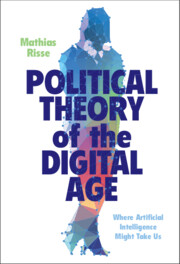Book contents
- Political Theory of the Digital Age
- Political Theory of the Digital Age
- Copyright page
- Dedication
- Contents
- Preface
- Acknowledgments
- 1 Introduction
- 2 Learning from the Amish
- 3 Artificial Intelligence and the Past, Present, and Future of Democracy
- 4 Truth Will Not Set You Free: Is There a Right to It Anyway?
- 5 Knowing and Being Known
- 6 Beyond Porn and Discreditation
- 7 The Fourth Generation of Human Rights: Epistemic Rights in Life 2.0 and Life 3.0
- 8 On Surveillance Capitalism, Instrumentarian Power, and Social Physics
- 9 Data as Social Facts: Distributive Justice Meets Big Data
- 10 God, Golem, and Gadget Worshippers: Meaning of Life in the Digital Age
- 11 Moral Status and Political Membership: Toward a Political Theory for Life 3.0
- Epilogue
- Bibliography
- Index
2 - Learning from the Amish
Political Philosophy as Philosophy of Technology in the Digital Century
Published online by Cambridge University Press: 02 February 2023
- Political Theory of the Digital Age
- Political Theory of the Digital Age
- Copyright page
- Dedication
- Contents
- Preface
- Acknowledgments
- 1 Introduction
- 2 Learning from the Amish
- 3 Artificial Intelligence and the Past, Present, and Future of Democracy
- 4 Truth Will Not Set You Free: Is There a Right to It Anyway?
- 5 Knowing and Being Known
- 6 Beyond Porn and Discreditation
- 7 The Fourth Generation of Human Rights: Epistemic Rights in Life 2.0 and Life 3.0
- 8 On Surveillance Capitalism, Instrumentarian Power, and Social Physics
- 9 Data as Social Facts: Distributive Justice Meets Big Data
- 10 God, Golem, and Gadget Worshippers: Meaning of Life in the Digital Age
- 11 Moral Status and Political Membership: Toward a Political Theory for Life 3.0
- Epilogue
- Bibliography
- Index
Summary
The Amish are an unusual case of a community intensely concerned with maintaining control over how technology shapes its future. Though the community’s old-fashioned ways strike many as perplexing, in the age of AI there are good reasons as to why technology and its regulation should be just about as central to mainstream politics as they are to the way the Amish regulate their affairs. Technology is not neutral, as many still think, but is intensely political. This also means that political philosophy and philosophy of technology should be more closely related than they typically are. Mainstream philosophy of technology has unfolded largely separately from mainstream political philosophy. The primary exception is the Marxist tradition that has long investigated the role of technology in the dialectical unfolding of history as Marx theorizes it. We use the Marxist tradition to identify three senses in which technology is political (the foundational, enframing, and interactive senses) and argue that the Rawlsian tradition also has good reason to recognize versions of these senses. In this era, political philosophy must always also be philosophy of technology.
- Type
- Chapter
- Information
- Political Theory of the Digital AgeWhere Artificial Intelligence Might Take Us, pp. 23 - 46Publisher: Cambridge University PressPrint publication year: 2023

